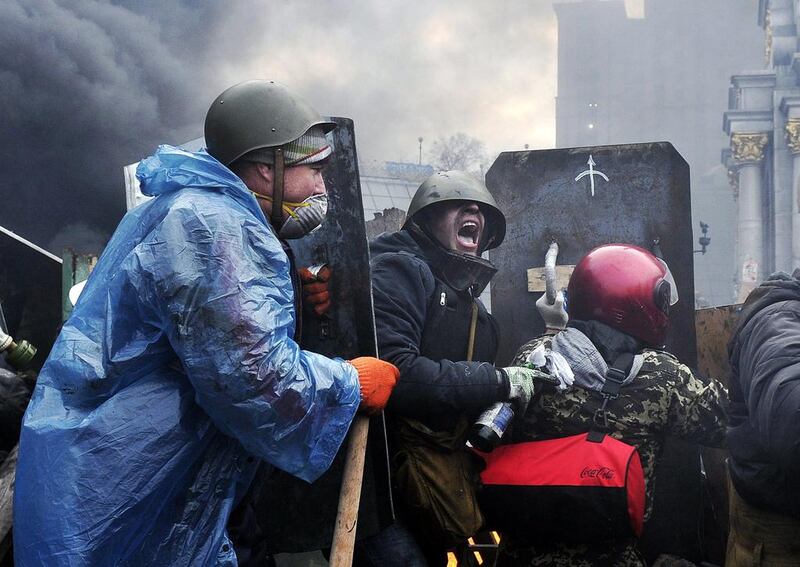KIEV // European Union officials held urgent talks with Ukraine’s president and opposition on Thursday to reign in an escalating political crisis as dozens more deaths were reported in battles between protesters and police.
Bodies of anti-government demonstrators lay amid smouldering debris after masked protesters hurling Molotov cocktails and stones forced gun-toting police from Kiev’s Independence Square – the centre of the three-month-old crisis.
Foreign ministers from France, Germany and Poland discussed a possible “road map” out of the crisis with President Viktor Yanukovich, which the government and opposition had yet to agree on, a German delegation source said.
The three EU ministers were also discussing the plan with opposition leaders and had extended their stay in Kiev until Friday, the source said.
In Brussels, EU foreign ministers agreed to impose a travel ban and assets freeze on Ukrainians with “blood on their hands”, said Italian foreign ninister Emma Bonino.
Ms Bonino said after the talks that the sanctions would be imposed “very rapidly in the next hours”.
More than 60 protesters died from gunshot wounds on Thursday, according to an opposition medic, making it the bloodiest day of violence since independence in the former Soviet country.
Police fired live ammunition “in self defence” when protesters threatened them, said the interior ministry, which also accused “radical extremists” of seizing 67 officers.
The United States expressed outrage that Ukrainian forces had turned automatic weapons on demonstrators.
“We are outraged by the images of Ukrainian security forces firing automatic weapons on their own people,” a White House official said.
The lobby of the Ukraina hotel overlooking Independence Square was turned into an impromptu morgue on Thursday, with the bodies of seven protesters side by side under white sheets on the marble floor in front of the reception desk.
Police said a sniper perched on a hotel roof had injured 20 officers with live ammunition fire, while protest leaders accused the city police of being behind the sniper attacks.
Reporters saw the bodies of at least 25 protesters with apparent gunshot wounds around two popular Independence Square hotels and lying outside the central Kiev post office.
Ukraine’s three main opposition leaders described the violence as a “planned provocation” by the pro-Russian government but Moscow blamed it on “extremists and hardliners” bent on sparking a civil war.
The clashes shattered a truce called by Mr Yanukovich late Wednesday in response to a spurt of violence on Tuesday that killed 28 people.
Speaking in Brussels at the EU meeting to consider sanctions, the British foreign secretary William Hague described the escalating violence as “utterly unacceptable and indefensible”.
Ukraine’s former master Russia blasted the possible sanctions as “bullying” and said its president, Vladimir Putin, was sending a representative to Kiev to act as a mediator in talks with the opposition.
The US state department has already announced travel bans on about 20 senior government figures over the fighting, which turned deadly despite apparent concessions on both sides earlier this week.
Mr Yanukovich has appeared to struggle to formulate a clear policy in the face of the escalating violence. He seemed determined on Wednesday to end the crisis by force after the security services announced plans to launch a sweeping “anti-terror” operation.
The president also sacked the army’s top general – a powerful figure lauded by the opposition for refusing to back the use of force against those the street protests.
But he then received three top protest leaders and told them he would take no immediate action against demonstrators.
Mr Yanukovich was dealt a further embarrassing blow when Kiev mayor Volodymyr Makeyenko resigned from the ruling party on Thursday in protest at the “tragedy” of the unrest.
The crackdown by the authorities has triggered a storm of condemnation from the West and a new war of words with Moscow.
France said ahead of the Brussels meeting that sanctions would be prepared specifically against those responsible for the violence.
The German chancellor Angela Merkel also urged Mr Yanukovich to accept EU help in his talks with the opposition and condemned the latest violence.
Moscow issued a string of comments condemning both the protesters and the West, with the foreign minister, Sergey Lavrov, accusing “extremists and hardliners” of trying to stoke civil war and describing sanctions as “bullying”.
Ukraine’s crisis was ignited by Mr Yanukovich’s shock decision in November to ditch a historic EU trade and political association agreement in favour of closer ties with Russia.
But it has since evolved into a broader anti-government movement that has swept through both the pro-western west of the country and parts of its more pro-Russia east and exposed the deep historical fault lines between the two.
The Russian prime minister Dmitry Medvedev said Moscow intended to follow through on its commitment to issue the next tranche of a $15 billion (Dh55) bailout agreed shortly after Kiev rejected the EU pact.
But Mr Medvedev said Moscow needs “partners who are in good shape and for the authorities that work in Ukraine to be legitimate and effective”.
* Agence France-Presse





